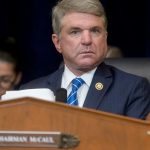Jim Edgar, the two-term Republican governor who guided Illinois through much of the 1990s with a low-key yet intense persona and a meticulous focus on fiscal matters aimed at preparing the state for the 21st century, died Sunday. He was 79.
Edgar died in Springfield, where he had been hospitalized due to an adverse reaction to treatment for the pancreatic cancer that he had been diagnosed with in January friends and associates said.
“It is with heavy hearts we share the news that our beloved husband, father and grandfather Jim Edgar passed away this morning in Springfield from complications related to treatment for pancreatic cancer,” family members said in a statement. “We are deeply grateful for the love, support and kindness so many have shown to Jim and our family over these last several months.”
Arguably one of the most popular governors in the state’s history, Edgar — who was born in the small town of Vinita, Oklahoma, but raised in Charleston, Illinois — provided stable governance through his reserved tone. It was a sharp contrast to his immediate predecessor, James R. Thompson, a Republican who was a constant campaigner and served a record 14 years with a grandiose, free-wheeling personality bent toward spending, building and dealmaking.
After leaving office in 1999, Edgar kept his word that his formal political career was over. He became a senior fellow at the University of Illinois’ Institute of Government and Public Affairs and declined efforts by fellow Republicans to be drafted as the state party chairman, make another run for governor and, twice, to run for U.S. Senate.
Still, he remained a political elder statesman and was called on for counsel by leaders in both parties, though in the past decade-plus, the GOP he once headed drifted considerably farther to the right as Illinois Republicans embraced Donald Trump’s twin presidencies.
“We reached out,’’ Edgar said in an emotion-laden speech on Aug. 20, 1997, when he announced he would not seek a third term as governor or enter the U.S. Senate race. “We have listened. We have responded — more than any administration in the history of this state. And because of that, Illinois is a better state, and we’re prepared for the future.”
While many Republicans nationally had expected Edgar to make a U.S. Senate bid, he expressed concerns about the affordability of raising his family in Washington, D.C. He also was clearly more interested in serving in the executive branch rather than the legislative branch.
Edgar entered the governor’s office amid a recession and his time as Illinois’ chief executive marked a brief era of relative fiscal restraint. But balancing the budget while dealing with spiraling health care costs for the poor and overdue state bills — and carrying out his desire to increase funding for elementary and secondary education — was later made easier by a post-recession economic recovery.
His perfect coiffure was almost a symbol of the attention he gave to governmental minutiae during a career in which he alternated between being a bureaucrat and a politician.
He battled with Chicago Mayor Richard M. Daley, who said the downstate politician didn’t understand Chicago. Critics dubbed him “Governor No” and contended he had no vision for the state.
But as part of the oral history project of the Abraham Lincoln Library and Museum in 2010, Edgar criticized politicians who used the word “vision,” saying it was “overrated” and that he had yet to see “any vision that’s worked.”
“What a governor has to do, and especially needs to do in Illinois — when I came in, and it needs now — you got to manage. If you can’t manage, a vision doesn’t do you any good. You got to manage,” Edgar said.
Edgar’s two successors wound up going to prison, which, he later observed, probably only enhanced his standing with the electorate.
“To me, the most important (thing) was what did the public think? The public’s pretty good in the end. The numbers I saw, the studies I’ve seen, the public thought things worked pretty well. They thought it then. I think in retrospect they think maybe even better now,” he said.
His comments came as state government reeled after the impeachment of Democratic Gov. Rod Blagojevich, who subsequently went to prison for corruption. Blagojevich had pledged reforms as Edgar’s successor, Republican Gov. George Ryan, was under federal investigation and ultimately imprisoned for corruption.
Edgar’s fiscal conservativism and moderate stance on social issues, including his support for abortion rights, for years made him the template for a successful statewide Republican candidate. But in recent years that template has been ignored by many hopefuls who wound up going down in defeat. Edgar himself said he doubted he could win a primary in the Trump-era of far-right GOP ideology.
Following a successful decade as secretary of state, Edgar won his first term as governor in 1990, defeating Democratic Attorney General Neil Hartigan 51% to 48%.
He fulfilled a politically risky campaign promise to make permanent a temporary increase in the state’s income tax for education. He also engaged in severe budget slashing, exhorting lawmakers to tear up the state’s “credit card” after years of passing pork-barrel projects.
Four years later, he defeated Democratic state Comptroller Dawn Clark Netsch in one of the state’s largest electoral landslides, capturing 64% of the vote, winning by more than 900,000 ballots and taking 101 of the state’s 102 counties, including Cook County. Netsch narrowly won tiny Gallatin County in downstate Illinois.
Edgar took pride in accomplishments as governor that included imposing fiscal discipline and job cuts, easing regulations that vastly expanded adoptions, providing health care to children from poor families, creating welfare-to-work programs, encouraging economic development and investing in and expanding natural resources.
During a brief two-year period of one-party Republican leadership of the governor’s office and the legislature in the mid-1990s, Edgar oversaw fiscal and management reforms for the Chicago Public Schools that gave control of the system to Daley, an achievement Edgar once called a “crown jewel.”
While Daley was publicly opposed to the school reforms due to union opposition, he privately worked on refining the plan with Republicans. Democrats have recently moved to decentralize mayoral power over the city’s schools and have embarked on the process to create an all-elected school board.
But Edgar openly clashed with Daley on issues ranging from the location of a third Chicago-area airport and efforts to build a new stadium for the Chicago Bears to proposals for land-based casino gambling and the future of Meigs Field, the former lakefront airport that Edgar wanted to keep open but which Daley envisioned as a park.
The third airport remains grounded, the stadium and casino proposals came about under different governors. But Daley eventually got his way on Meigs by staging a secretive midnight demolition of its runway.
Edgar failed in his effort to secure a $2 billion increase in state taxes in exchange for a $1.5 billion cut in property taxes to fund local schools. Republican legislative leaders, who had gained a majority in the House and Senate two years earlier, balked at the election-year plan. He had attacked Netsch for proposing a similar tax-swap plan during the campaign.
Edgar also was the architect of the state’s pension funding ramp, an effort to deal with paying for the unfunded liability of public state employees and teachers pensions over a 50-year period. The ramp backloaded payments into later years and the unfunded pension liability has risen from $20 billion when it started to over $140 billion, and state payments now comprise nearly 20 cents of every budget dollar.
Edgar said the plan was never envisioned as a one-time fix and that future state governments should have modified it, but that was never done and some successor governors and legislatures did not adequately pay into the ramp.
His tenure as governor was not without scandal.
His tollway chief, Robert Hickman, a former Charleston mayor who also was a close friend and influential fundraising aide in Edgar’s political career, was convicted along with a state lawmaker in a fraudulent land-sale scheme in 1997.
Later that year, as Edgar was weighing his political future, a computer programming firm that was one of his top political donors, Management Services of Illinois, Inc., was convicted on federal fraud and bribery-related charges along with a company co-founder. The firm bilked the state out of $12.9 million through a retroactive beneficial contract renegotiation for identifying Medicaid recipients that were not entitled to benefits.
Edgar was not accused of wrongdoing, but in testifying for the defense in two trials, he became the first sitting governor in Illinois in 75 years to make such a court appearance. Edgar said he had no role in MSI’s contract and denied the case played any role in his decision to retire from public office.
In August 1997, after much angst over whether to quit, run for re-election or seek a U.S. Senate seat, Edgar opted to end his elected political career at the completion of his second term. He later said he had three speeches prepared, but finally decided that he simply wanted to go out while he was on top.
“So I practiced all three of the speeches. I got to the speech saying I wasn’t going to run again, and I broke down. I could not get the words out, because you realize that if you don’t run, you’re just voluntarily giving up all this power and something you worked for all your life. I’d never experienced that,” he recounted in the oral history.
“It dawned on me why it’s so hard to get people to retire, why people stay too long. They don’t want to let go. They worked all their life to get to this point, and to me, the governorship was the point,” he said.
Though he said running for reelection was a viable option, “I also thought I’ve done the job, I’ve kind of done it, and now there’s other things in life to do while you can still do it.”
In later years, Edgar bemoaned the rightward shift of the state’s Republican Party leadership as an unwinnable formula for statewide GOP candidates, particularly in the suburbs. He also disdained the campaign and management style of Trump.
A teetotaler who shifted to a heart-healthy diet, Edgar had a history of heart problems and during his 1994 re-election year underwent a quadruple bypass operation.
Then, with almost six months remaining in his second term, Edgar was hospitalized on June 6, 1998, with heart-related problems when doctors identified a slowed blood flow in a tiny vessel leading to his heart. It was his third heart-related hospitalization while serving as chief executive but physicians determined it would be treated with medication.
On Feb. 24, 2025, Edgar disclosed his pancreatic cancer diagnosis to past participants of the “Edgar Fellows,” a bipartisan program he led through the University of Illinois aimed at training the state’s future political leaders.
“Doctors at Rush University Medical Center in Chicago have determined I have pancreatic cancer that has spread,” he said on behalf of himself and his wife, Brenda. “We do not underestimate this challenge, but we have confidence in the medical team helping us address it.”
Edgar’s governmental career spanned three decades in Springfield as he rose through the ranks from legislative aide to state legislator, to governor’s staff and eventually to statewide office.
James Robert Edgar was born in Vinita, Oklahoma, the youngest of three boys, and was raised in Charleston, Illinois, by his mother Betty, after his father died in an automobile accident when he was 7.
In first grade, he ran a mock presidential campaign for Dwight D. Eisenhower at his elementary school, cementing himself as a future Republican in a Democratic household.
Shortly after his 1968 graduation with a history major from Eastern Illinois University, where he served as student body president, he worked as a legislative assistant to then-House Speaker W. Robert Blair and to W. Russell Arrington, then the Senate Republican leader.
In 1974, he made an unsuccessful GOP primary bid for the Illinois House in which the legislative leaders he worked for did not support him. But Edgar won a House seat in 1976 and was reelected in 1978 before becoming director of legislative affairs for Thompson the next year.
In January 1981, Thompson plucked Edgar from his duties as gubernatorial lobbyist to become secretary of state, a post left vacant when Democrat Alan Dixon was elected to the U.S. Senate.
Thompson said he chose the relatively unknown Edgar for the job, a traditional stepping-stone to higher office, to represent a new younger vitality in the state’s Republican Party.
Almost immediately, Edgar began building his reputation on toughening the state’s loophole-laden drunken-driving laws. The crackdown earned him a high profile that led to his election to the office for two full four-year terms.
Along the way, Edgar also fought successfully to require motorists to carry liability insurance, and his growing stature, as well as his relative youth, positioned him for a run for governor when Thompson announced he would not seek a fifth term in 1990.
On the eve of his decision not to seek a third term as governor, his mind still not completely made up, Edgar reflected on his time as Illinois’ chief executive.
“I can leave as governor tomorrow and feel very good about what I’ve done as governor, that we’ve made a difference,” Edgar said. “There’s always more to do. The question is: Is there more I need to do? Or is it the point where it’s time to let somebody else try.”
Edgar, an avid horseracing fan and horse owner, once said being governor was “the best job in American politics.”
“In the end, in a democracy, the public has to feel satisfied for you to be a success. It’s nice to get the editorials, it’s nice to get the stories and things, but more importantly, I think you just want the guy in the street to say, ‘Oh, you did a good job.’”









